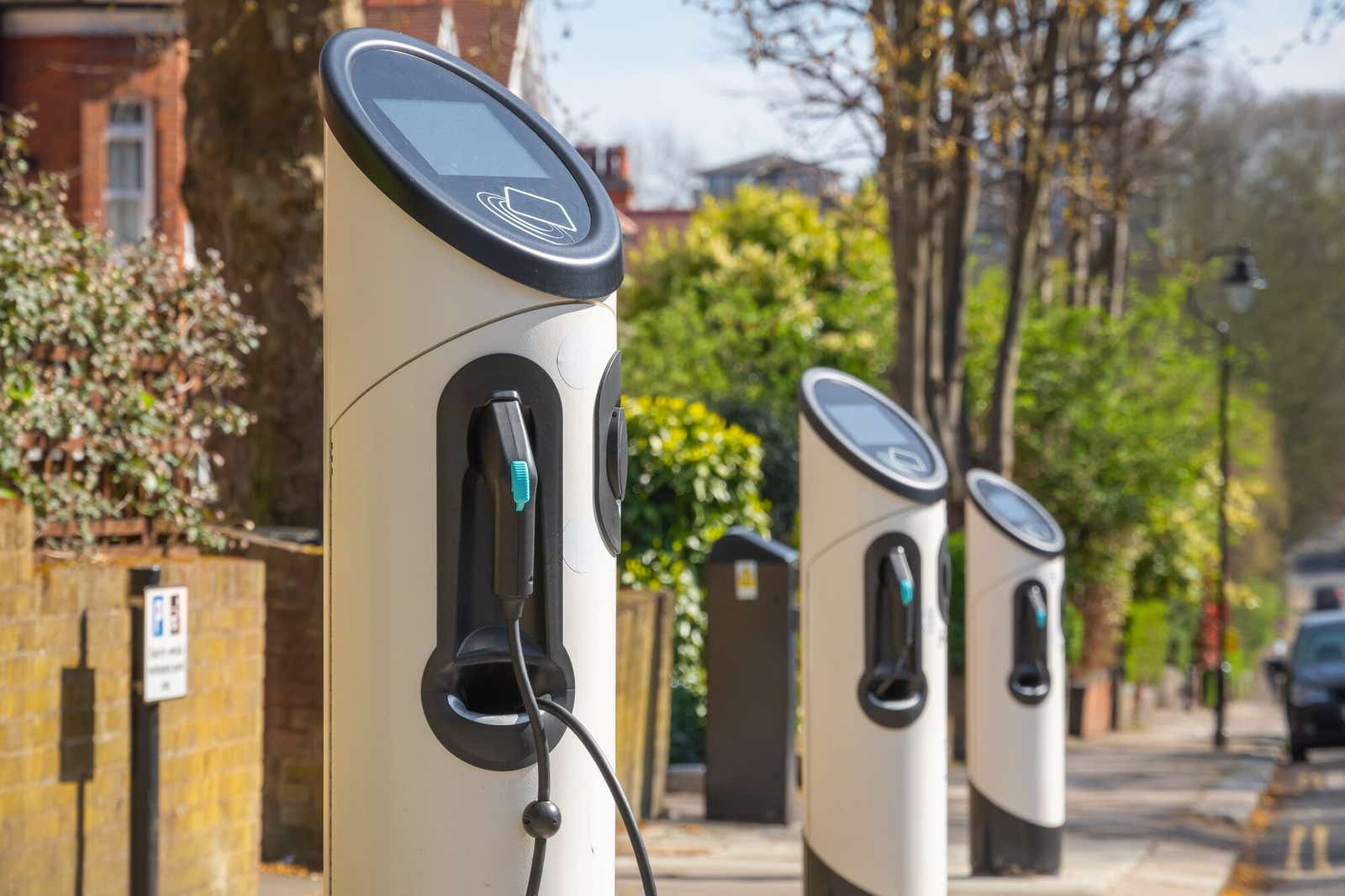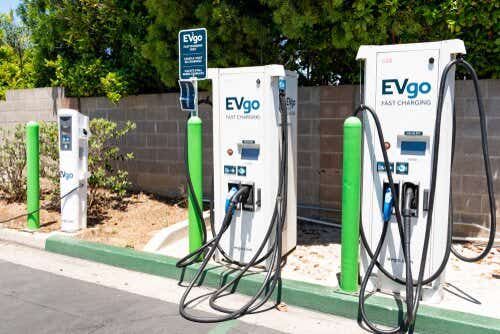The revolution may not come not with a bang, but with a whisper. Specifically, the whisper of tyres on tarmac and maybe the sound of an acoustic vehicle alert. In a decade or two, there’s every chance that electric cars will outnumber petrol cars on roads in the UK and around the world. Government mandates and manufacturer commitments to electric vehicle production over traditional fuel models are designed to be more environmentally friendly to combat climate change.
Five or ten years ago, you’d be hard-pushed to have seen an electric car driving around, but now they’re a common sight. Tesla alone has sold over a million Model 3 electric cars as of the end of 2022, and with companies including Nissan, BMW, Jaguar and Volkswagen committed to electric vehicle production, those numbers will only grow.
Will electric cars be embraced by consumers? They may not have a choice. In the UK, the government intends to outlaw the sale of petrol and diesel vehicles by 2030 (with sales of those kinds of vehicles declining year on year as it is), while CO2 emissions are being cracked down on throughout Europe and in other parts of the world. While it’s very unlikely that petrol and diesel vehicles will be illegal to drive from 2035, this is the way the wind is blowing.
Electric vehicles (or EVs) have grown in popularity in the last few years as range, choice and practicality improves. Approximately 265,000 battery-electric cars were registered in 2022, which constitutes a 40% improvement on vehicles registered in 2021.
With a £300 million investment in the UK's public charging infrastructure underway, the future is bright for those who want to make their next car an electric model.
So what do you need to know about electric cars now? What’s it like to own an electric car in 2025 and what are the cost considerations?
Electric cars: driving an energy revolution
The popularity of EVs is being driven by a number of different factors:
- UK government goals: The previous Conservative government committed to banning new petrol and diesel car sales by 2035. Labour has cut this deadline to 2030. Hybrid cars may still be allowed.
- Manufacturing objectives: By 2035, 80% of cars that roll off the production line must be zero-emission. If not, manufacturers risk fines of £15,000 for each missed vehicle.
- Infrastructure investment: There’s been a £300m investment in the UK's public EV charging points. In January 2024, there were 53,677 - an increase of 9% on the previous year.
- EVs cost less to drive. Estimates suggest that driving an EV could save you an average of £700 a year compared to petrol and diesel cars. This could explain their growing popularity. 338,314 battery electric vehicles were registered in the year UK to Dec 2024, a 17.9% year on year increase.
- Reduced cost of electric car insurance. EVs tend to cost more to buy than petrol or diesel cars, and insurance has followed suit. But that’s changing. Find out more about electric car insurance.
EVs: a quick history
Electric vehicles have existed for over a century.
- 1881 - an electrical engineer called Gustave Trouvé presented an electric car in Paris.
- 1897 - electric taxis were running in London and New York. They remained until the 1910s and the advent of the internal combustion engine.
- 1972: chemist Stanley Whittingham invented the lithium-ion battery which was used in electric cars 20+ years later.
- Early 1990s: Honda, General Motors, Chrysler and Nissan started producing EVs after a push for reduced emissions in California. All were eventually taken off the market.
- 1997: Toyota’s Prius launched as the world’s first mass-produced hybrid.
- 2004: Tesla began developing the all-electric Roadster. It went on sale in 2008.
What types of electric car are there?
Before deciding whether you’re ready to make the switch to electric, it’s important to understand the different types of electric cars that are currently available. The most common types of plug-in electric vehicles are:
- Battery electric vehicles (BEVs). These have a 100% battery-powered motor and are also known as battery-only electric vehicles, fully electric vehicles or all-electric vehicles. With a battery-only vehicle you can expect about 100-200 miles of driving from a single charge. Popular BEV models include the Nissan Leaf, Renault Zoe and Kia e-Niro
- Plug-in hybrid electric vehicles (PHEVs). These cars run on a combination of battery-powered motor with an additional petrol or diesel-powered engine. The battery fuels the car for up to 70 miles, with the internal combustion engine providing back-up power for further range and higher speeds. Popular PHEVs include the Mitsubishi Outlander, Volvo XC90 and Volvo XC60
- Hybrid electric vehicles (HEVs) are another popular option for alternatively fuelled transport. So-called ‘self-charging’ hybrids power the battery from the car’s own braking system (using a combination of fuel and electricity), so don’t need plugging in but still require filling up with fuel. In the UK, drivers of hybrid vehicles pay the lowest amount of car tax and are exempt from the London congestion charge. The best-known hybrid vehicle is probably the Toyota Prius, with over 15 million units sold globally.
Our guide to the best electric cars could help you find the right model for your needs.
How much do electric cars cost to buy?
On average, a brand new EV is more expensive than a petrol or diesel car. This is because EVs are produced in smaller numbers and their batteries are expensive to produce.
However, as more are made and with the evolution of the second-hand electric car market, prices are likely to fall. EVs also tend to depreciate more slowly than petrol and diesel cars.
Where can I charge my electric vehicle?
With the increase in public EV charging points, you’ve got plenty of choice.
EV charging points include:
- Residential areas
- ‘En route’ locations e.g. motorway services, electric forecourts and ferry terminals.
- Destinations where you’re likely to stop for an extended period of time e.g. car parks, leisure centres, schools, hotels.
- Semi-public locations e.g. workplace car parks and dealership forecourts.
Charging speeds vary depending where you are too:
- Slow (3kw to 6kW)
- Fast (7kw to 22kW)
- Rapid (25kW to 100kW)
- Ultra rapid (100kW and faster)
You can also charge your EV at home. Electric Nation Smart Charging Trial data from 2018 showed that 87% of electric car charging is done at home using a home charging point.
Find out more about the EV home charger installation process.
How green are electric cars?
If you’re comparing electric cars to petrol cars, then electric cars are immediately and obviously the greener option because they don’t use fossil fuels that pollute the environment to run. In the context of the wider drive for green energy, though, are electric cars a good option?
Ultimately, it depends on how the power you use to charge them is generated. Energy tariffs can offer electricity generated by coal-fired power plants or by more green methods like solar, wind or tidal plants, so even though the vehicle’s emissions will be lower whatever the source of the energy, it can’t be called “green” unless it comes from one of those more environmentally-friendly sources. The pollution may not be coming from the car itself, but it will have come from the plant that produced the electricity it runs on, so the point of driving the car is moot.
With this in mind, remember that it’s not enough to simply buy an electric car and think your green contribution is complete - the greenest drivers are those who combine the right kind of vehicle and tariff.
What are the best electric cars or best EVs?
The best EVs are those that meet your specific needs.
Before buying an electric vehicle, think about the following:
- Your average journey length - then compare this with the car’s range on a single charge.
- Costs - including upfront costs, charging and home charger installation. Do an electricity comparison to find the best EV tariff. You should also factor in EV insurance. Premiums tend to be higher because EVs are heavier than traditional cars, which can cause additional damage during impact.
- Maintenance - costs are lower for BEVs because they have fewer moving parts and don’t require oil changes. Their gearboxes are simpler, requiring less money spent on wear and tear. But replacing the battery can cost thousands.
- The type of EV you want - BEVs are fully electric, while hybrids offer a middle ground, keeping traditional fuel in the mix.
- The make and model - there’s plenty of choice, from the family-friendly Renault Zoe to the high-performing Porsche Taycan. Alternatively, Autoexpress and Whatcar suggest that the Tesla Model 3 is the best electric car on the market.
Should I buy an electric car?
While most people associate electric vehicles with environmental benefits, the cost benefits are impressive too.
Running costs for electric cars can be much lower than petrol and diesel vehicles. For fully electric vehicles you don’t have to fill up on fuel at all, and plug-in hybrids will use much less fuel than a standard car.
Fully electric cars worth under £40,000 are also exempt from vehicle excise duty (commonly known as road tax), though this will change from 1 April 2025.
Electric vehicles are also exempt from the London Congestion Charge and Ultra Low Emission Zone (ULEZ), meaning a saving of up to £12.50 per day for drivers in the capital.
What incentives are there for electric car purchases?
As we’ve already noted, the upfront cost of an electric car is usually greater than that of a petrol or diesel car, though the ongoing running costs will even things out. With that in mind, purchasers may be interested in the incentives that are available to help reduce the initial cost of an EV.
Workplace Charging Scheme
The Workplace Charging Scheme is designed to help businesses encourage their employees to choose lower-emission vehicles by applying for vouchers worth up to £350 per socket to help with the cost of buying and installing charging points at their premises.
How much does it cost to charge an electric car at home?
While electric car owners will save on fuel and tax, it’s important to consider the cost of charging. Electric Nation Smart Charging Trial data in 2018 found that 87% of electric car charging is done at home using a home charging point.
Just as the cost of filling up with petrol varies depending on the car and the cost at the forecourt, electric vehicles will also vary in how much they cost to charge. The cost of charging your electric car at home will depend on two factors:
- The size of your car’s battery
- How much you pay per unit of electricity.
Pod Point calculates the most popular all-electric car, the Tesla Model 3, would cost up to £21.81 to fully charge at home, based on an electricity rate of 28p/kWh. Electric vehicles with smaller batteries, such as the Nissan LEAF, could cost around less per charge.
Home energy costs are often higher for EV drivers - although this extra expense is usually significantly outweighed by the running cost savings and environmental benefits.
The cost of charging your electric car at home will be included in your normal electricity bill, so you should carefully consider your energy costs and choose the right energy deal for you so you don’t overpay.
What energy tariffs are there for electric cars?
It’s worth considering your usage, charging hours and any additional extras offered by the supplier when deciding which is the best tariff for you.
Many energy suppliers have introduced specific EV energy tariffs to help drivers maximise their savings, thanks to increased awareness and demand from customers. This is also because it’s much easier to reliably offer green electricity than green gas (which involves various complicated carbon offsetting measures).
These often work similarly to domestic Economy 7 tariffs where electricity is charged at a lower unit rate for seven hours during the night, allowing drivers to charge their vehicles during the night so it will cost them less and they’ll have a fully charged car in the morning. While not all suppliers offer specialist EV tariffs at the moment, they’re likely to become more commonplace as electric cars grow in popularity.
All EV tariffs currently available offer 100% renewable electricity, with many offering discounts on home charge points plus other benefits.
The general requirements for all EV tariffs are:
- Your bill must be collected by monthly direct debit (EV tariffs are not available for those on prepayment meters)
- You must have a smart meter or be willing to have one installed
- You must own or lease an EV vehicle.
It’s important to choose your energy tariff carefully if you’re getting an electric vehicle, because you’ll be doing most of your vehicle charging at home as opposed to at one of the charging points located across the country.
Look out for EV energy tariffs from the likes of EDF Energy, OVO Energy, British Gas and Octopus. The number of tariffs on offer will only increase as the use of EVs becomes more widespread.
How much does it cost to charge an electric car on the go?
An overnight charge at home will provide enough range for most journeys, road trips beyond your car’s range will mean the car needs topping up on the way.
Thankfully the UK’s charging infrastructure is improving all the time, with the number of public charge points increasing from around 1,500 in 2011 to nearly 73,699 at the end of December 2024. Ofgem is investing millions to install 1,800 ultra-rapid charge points at motorway service areas and key trunk roads and a further 1,750 charge points across towns and cities.
You’ll find charging points at motorway service stations, some petrol stations, shopping centres and car parks. Pod Point estimates they cost around £26 for a full charge. Some public charge points work on a subscription basis and some offer free charging.
While it’s worth knowing the cost of charging on the go if you need to, the vast majority of charging will be done at home between trips. This is where there's a significant opportunity to save by ensuring you’re on the best energy deal for your needs.
How to save money on electric vehicles
In addition to taking advantage of government incentives and comparing prices to find the best EV tariff, here are a few handy tips for cheaper charging:
- Find free charging points - some car parks, supermarkets and shopping centres offer free charging points to customers. Try planning your journeys to take advantage of these, making you less reliant on your home charger. More places of business are installing free access points in corporate car parks as an incentive to employees
- Use a companion app - monitor your battery’s life and condition with a smart charging app designed to keep track of your usage. Because the best EV energy tariffs also require a smart meter within the home, you can also download the corresponding app to gain greater insight into your household energy use
- Don’t run your battery down - it takes more energy to recharge the battery once it’s been run down to the lower limits. A good rule of thumb is to avoid letting it get to the 20% mark, or you’ll end up spending more on energy.
- Avoid overheating your battery - lithium-ion batteries can be damaged if they get too hot, so to save money on repair and maintenance it’s important to protect your car from direct sunlight. Look for charging points in the shade and store your EV in a garage when possible.
By doing a bit of research into your EV electricity tariff and charging options, you could potentially save a bundle over time.
Are electric cars worth the cost?
If you’re in the market for a new car, you’ll probably notice that electric cars tend to have a higher price tag than petrol or diesel-powered models. You’ll pay higher up-front costs for an EV, but it’s important to consider the big picture when you’re weighing up whether or not it’s worth it. There are savings in fuel costs, as well as tax exemptions and EV energy tariffs. Some energy suppliers allow you to sell excess car battery charge back to the National Grid, which adds up to even more money in your pocket over time.
Maintenance costs for BEVs are far lower because electric cars involve fewer moving parts and don’t require oil changes. Their gearboxes are simpler, requiring less money spent on wear and tear. As the technology continues to improve, we’ll see even greater savings in the future.
However, there are other areas where it costs more to run an electric vehicle. One example is car insurance, which is more expensive than it is for conventional vehicles. Premiums tend to be higher because EVs are heavier than traditional cars, which can cause additional damage during impact. And although maintenance is cheaper, when something does go wrong repairs can be costly.
FAQs
Are EVs safe to drive?
Yes - they pose no more of a risk to drivers’ and passengers’ safety than petrol cars and each model is naturally put through rigorous safety tests, both by manufacturers and independent safety bodies. There have been a small number of fires caused by the lithium batteries in Tesla cars, but data has been published showing that these are no more common than fires caused by regular cars.
What’s the difference between “fast” charging and “rapid” charging?
“Fast” charging units charge vehicles from 7kW to 22kW and tend to be confined to domestic properties, while “rapid” charging units charge vehicles from 43kW to 150kW and are usually found in public spaces like service stations or supermarket car parks.
How long do electric car batteries last for?
Most electric car batteries are guaranteed by manufacturers to last for eight years or around 100,000 miles, which should be enough for most people.
How do you service an electric car?
Because electric car servicing is still specialist knowledge to an extent, you won’t be able to take it to any garage when it needs looking at - make sure you go to a dealer or garage where EV maintenance is specified.
Do you need a special license for driving EVs?
No, you can drive an EV if you got your license driving a petrol car. However, if you pass your test in an EV, you’ll only be qualified to drive automatic petrol cars because EVs don’t have gears.
Are EVs only suitable for urban areas?
EVs can handle driving in any area with ease, but urban areas may have more charging points in locations like supermarkets than rural areas do. Use a charging point map to see how many charging points are near you and where they are so you can assess whether an EV is a sensible choice for your location.




